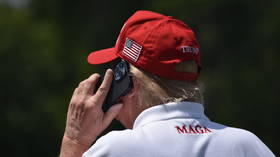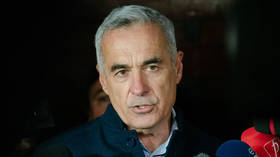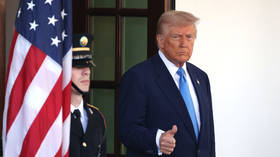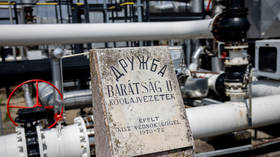Man of the people, or Euro fat cat? Chancellor hopeful Martin Schulz bids to take Merkel’s post
With Germany heading for federal elections on Sunday, RT looks at the controversies surrounding Martin Schulz, the Social Democrat candidate to challenge Angela Merkel.
The leader of the German Social Democratic Party (SDP) and the former president of the European Parliament, Martin Schulz is Angela Markel’s main opponent in her quest to become Chancellor for the fourth time. While his party’s popularity has dwindled in the months leading up to the elections, he still refuses to accept Merkel’s likely win, urging undecided voters to choose the SPD.
READ MORE: It’s the economy, stupid – why Angela Merkel will probably win again
Despite being widely known for his career of a top European bureaucrat, Schulz’s election campaign is touting him as a man of the people, who knows hardships of the common folk. During his early years, Schulz strived to become a professional footballer, and he never graduated from high school, dropping out of the 11th grade after failing his finals twice. His football career, however, ended due to a knee injury, scarring Schulz not only physically, but emotionally. The young man received training as a bookseller, but took to drinking and by his early 20s suffered from alcoholism and event tried to commit suicide in 1980. He eventually successfully went through rehab, breaking free from his addiction and subsequently opening a bookstore in 1982.
His troubled youth, however, seemingly did not affect his political endeavors. In 1974, at the age of 19, Schulz joined the SPD. In 1987, at the age of 31, he became the youngest mayor in North Rhine-Westphalia. He held the office till 1998.
Schulz graduated from local to European politics, becoming a MEP in 1994, and eventually being elected the President of the European Parliament in 2012. Schulz served as president for three consecutive terms until January 2017, when he unexpectedly announced his return to national politics.
During his years as the president of the EU Parliament, Schulz gained the reputation of someone who was prepared to compromise, developing a close relationship with his former rivals, including the President of European Commission, Jean-Claude Juncker. Schulz has even been accused of helping his friend Juncker by blocking an investigation into Luxembourg tax scandal, where large companies got generous tax vacations.
READ MORE: ‘Turkey shouldn’t become an EU member’: Merkel agrees with debate rival Schulz
Schulz’s terms were plagued by allegations of him living in excessive luxury, paid for by the taxpayers. He had two limos, two chauffeurs and at least 33 assistants, according to media reports, citing his fellow MEPs. Schulz’s luxurious way of life casts a shadow on both his social democratic political views and his image as a “man of the people.”
“The Queen of Sheba probably had less staff, certainly less chauffeurs. I can’t decide if Martin Schulz is a Bollinger Bolshevik or a Foie Gras Federalist,” UK MEP Nigel Farage said.
READ MORE: Germany can't rely on 'erratic' Donald Trump, Merkel's election rival warns
Some voters may find similarities in the programs of Schulz and Merkel, which might be the legacy of a longstanding “grand coalition” government. However, there are also apparent disagreements between the two that Schulz has been trying to exploit.
He has criticized Merkel for not using the steady surplus of the German budget to invest more in infrastructure and raising people’s living standards. Schulz is also a vocal opponent of the increase in defense spending in line with the NATO benchmark of 2 percent of GDP, while Merkel plans to effectively double government spending on armaments.
Schulz also chimed in with mild criticism of Merkel’s open-door refugee policy, blaming her for acting alone without securing the assistance of other EU member states at the height of the migrant crisis.














